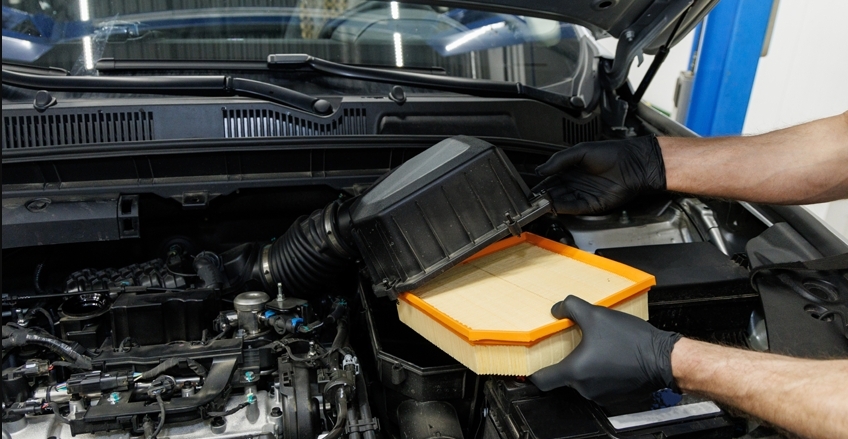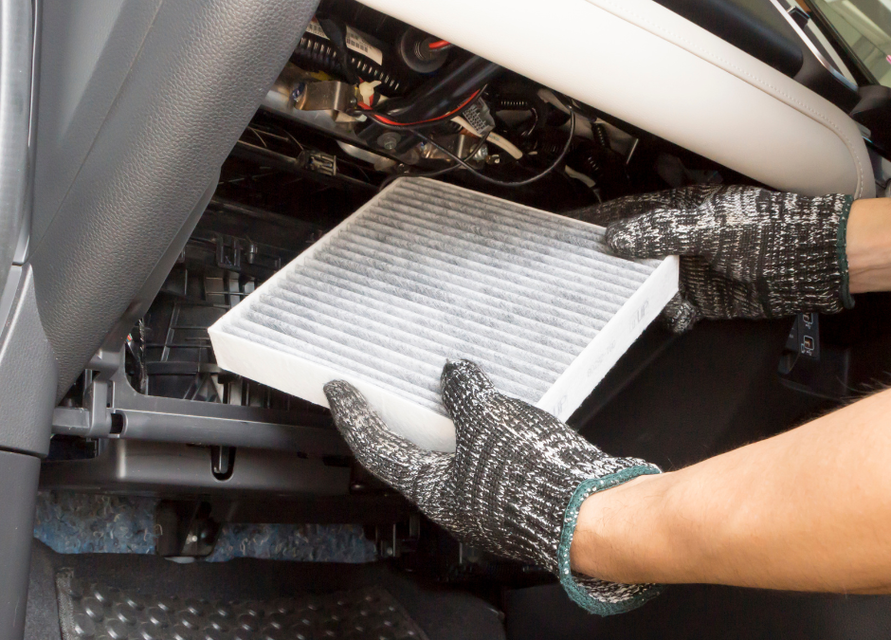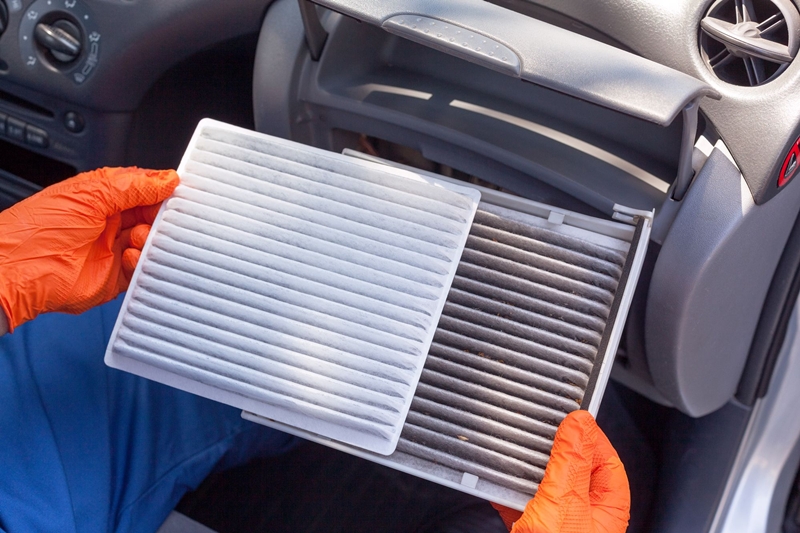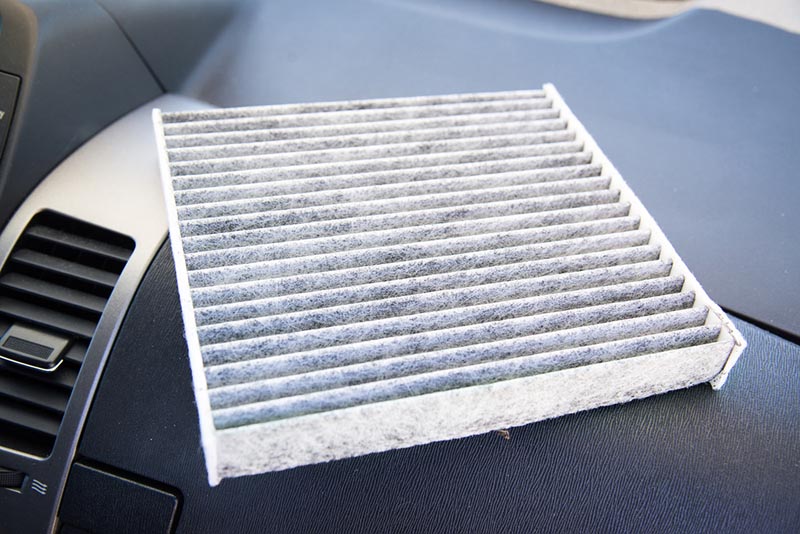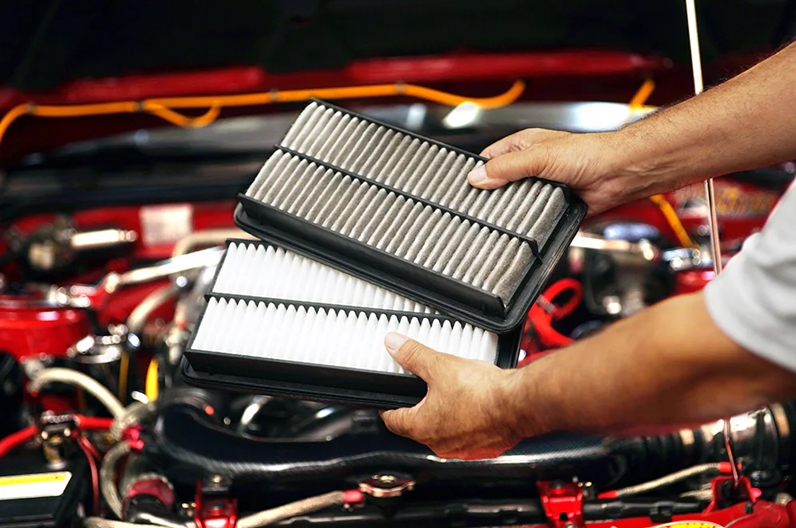Overview
If you’re wondering how often to change car air filter to get better gas mileage in a truck or a small car, you’re not alone. One of the most overlooked maintenance tasks is regularly changing your vehicle’s air filter. This simple yet crucial component plays a significant role in your car’s performance, fuel efficiency, and overall health. In this comprehensive guide, I’ll walk you through everything you need to know about car air filters—what they do, how often to change car air filter, signs that indicate replacement is needed, and step-by-step instructions for DIY air filter replacement.
Whether you drive a gas-guzzling truck or a compact fuel-efficient car, proper air filter maintenance can make a noticeable difference in your vehicle’s performance and help you save money at the pump.
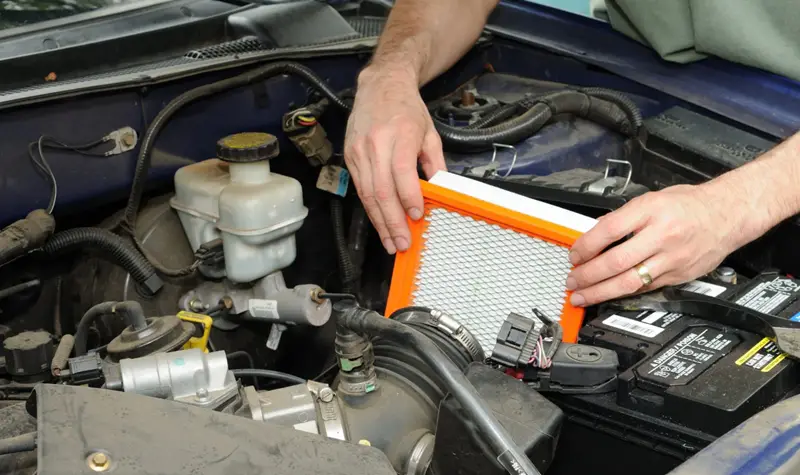
What Does a Car Air Filter Actually Do?
Your car’s air filter serves as the respiratory system for your vehicle’s engine. Just like we need clean air to breathe efficiently, your engine requires clean air for optimal combustion. The air filter’s primary job is to trap dust, dirt, debris, and other airborne particles before they can enter your engine.
When you press the gas pedal, your engine draws in air and mixes it with fuel for combustion. A clean air filter ensures this process happens smoothly by:
- Preventing harmful particles from entering the engine
- Maintaining the proper air-to-fuel ratio
- Protecting sensitive engine components from premature wear
- Supporting efficient combustion for better performance
Without proper air filter maintenance, your engine is forced to work harder, which directly impacts how to get better gas mileage. The Department of Energy estimates that a clean air filter can improve fuel efficiency by up to 10% in older vehicles, while modern cars with fuel injection systems still see performance benefits even if the fuel economy improvement is less dramatic.
Clean vs. Dirty Air Filter Comparison
| Feature | Clean Air Filter | Dirty Air Filter |
|---|---|---|
| Engine Performance | Smooth acceleration, responsive throttle | Hesitation, sluggish acceleration |
| Fuel Efficiency | Optimal fuel economy | Reduced MPG due to improper air-fuel mix |
| Engine Health | Protects internal components from contaminants | Allows dust/debris to enter engine over time |
| Emissions | Lower emissions, better environmental impact | Higher emissions due to poor combustion |
| Airflow | Unrestricted, steady airflow to engine | Restricted airflow causing engine strain |
| When to Replace | Not needed yet, but inspect regularly | Replace immediately to restore performance |
| Related to Maintenance | Supports long-term reliability | Can shorten engine lifespan if ignored |
| How Often to Change | Typically every 12,000–15,000 miles or annually | Shows why tracking how often to change car air filter is essential |
Knowing how often to change car air filter can help you stay ahead of performance issues and avoid unnecessary wear on your engine. It’s a small habit that delivers big results.
Understanding how often to change car air filter is crucial because waiting too long can reduce airflow and throttle response. In high-pollution or dusty environments, you may need to inspect or replace the filter more frequently than the standard recommendation.
I remember when I first neglected my air filter replacement in my old Toyota. The drop in performance was subtle at first, but after finally performing the engine air filter replacement, the difference in acceleration and smoothness was immediately noticeable. My highway mileage improved by almost 2 MPG—a clear example of how this simple maintenance task pays for itself once you know how often to change car air filter based on your driving conditions.
Also read: Finding the Best Cabin Air Filter for Your Vehicle: A Complete Guide
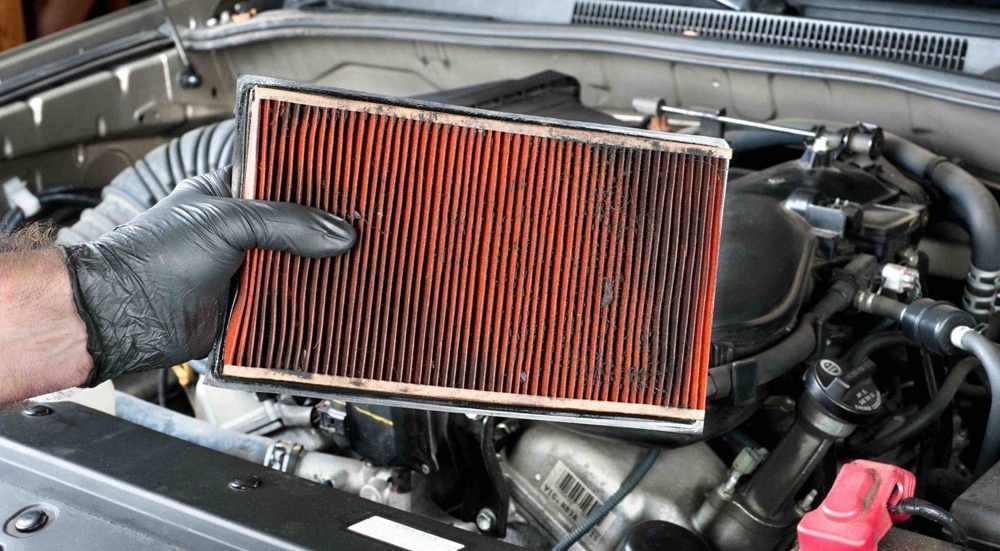
How Often Should You Replace Air Filter? The General Rule
The question of how often to change car air filter doesn’t have a one-size-fits-all answer, but there are some general guidelines you can follow. Most manufacturers recommend replacing the air filter every 15,000 to 30,000 miles, though this range can vary quite a bit depending on your driving conditions and environment.
Here’s a more detailed breakdown to help you decide:
- Normal driving conditions: Every 15,000–30,000 miles (or about every 1–2 years)
- Dusty or dirty environments: Every 5,000–15,000 miles—or even sooner
- Urban driving with heavy traffic and pollution: Every 10,000–20,000 miles
- Rural or consistent highway driving: You might get away with over 30,000 miles
Instead of sticking strictly to mileage, I’ve found it more effective to get in the habit of visually checking the air filter during routine maintenance. After moving from suburban streets to a rural area with lots of gravel roads, I was surprised to discover my air filter completely clogged after just 8,000 miles—way sooner than the 20,000-mile interval I was used to.
If you’re serious about maximizing fuel economy and engine performance, it helps to think beyond just mileage. A quick inspection every six months—or whenever you get your oil changed—is a smart way to stay ahead of problems and understand how often to change car air filter for your specific situation. It’s a small habit that can make a big difference.
Find a mobile mechanic near you
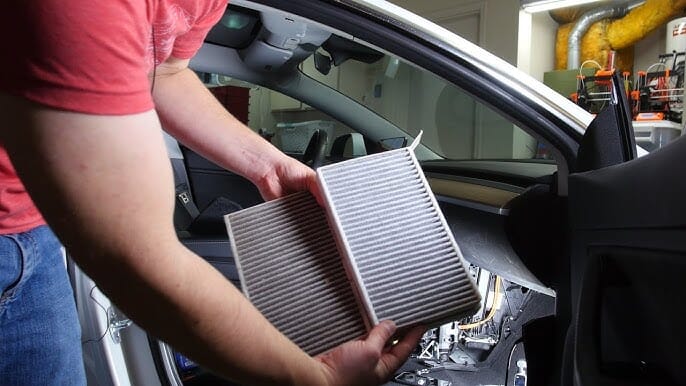
Warning Signs Your Vehicle Air Filter Replacement Is Overdue
Sometimes your car will let you know it’s time for an auto air filter replacement before you hit the recommended mileage. Understanding these warning signs can help you take action before performance drops—or worse, damage occurs. These symptoms are great reminders for assessing how often to change car air filter based on real-world conditions, not just numbers.
Most common indicators that it’s time to change your engine air filter:
- Reduced fuel efficiency: If you notice you’re filling up more often or your MPG has dipped, a clogged air filter might be the reason.
- Unusual engine sounds: If your engine starts sputtering or popping, the air-to-fuel mixture could be off due to restricted airflow.
- Sluggish power and acceleration: A dirty air filter makes it harder for your engine to “breathe,” which affects acceleration and overall performance.
- Check engine light: Some modern vehicles will trigger a check engine warning if the air filter is severely restricted.
- Black smoke or flames from the exhaust: Extreme but possible—this indicates an imbalanced air-fuel mixture caused by lack of clean airflow.
- Dirty appearance: A clean air filter looks white or off-white. If yours looks gray, black, or packed with visible gunk, it’s time to replace it.
Last summer, I noticed my SUV struggling to get up steep hills—a first. When I popped the hood, I found the air filter completely yellowed and caked with pollen and dirt (thank you, allergy season). That experience was a clear reminder that even if you’re tracking mileage, being flexible about how often to change car air filter based on what your vehicle is telling you makes a big difference. Once I swapped in a new filter, the pep in my SUV’s step returned instantly.
DIY Engine Air Filter Replacement: Saving Money and Time
One of the best parts of air filter maintenance is that it’s one of the simplest DIY car tasks out there. You don’t need fancy tools or tons of time. Most people can complete an engine air filter replacement in under 10 minutes, and it can save you a surprising amount of money over time.
Here’s a quick step-by-step guide for how to do your own engine air filter replacement:
- Locate the air filter housing: Usually a black plastic box near the engine—check your owner’s manual if you’re unsure.
- Open the housing: Most have clips or screws you can undo by hand or with a screwdriver.
- Check the filter position: Before removing it, take note of how the filter is installed.
- Remove the old filter: Simply lift it out.
- Clean the housing: Wipe away dirt or leaves with a cloth before inserting the new one.
- Install the new filter: Match the position of the old one.
- Secure the housing: Snap the clips or tighten the screws to close it back up.
I’ve saved hundreds over the years by handling engine air filter replacement on my own. Dealerships often charge $100–$200 for this service, yet the actual part usually costs just $15–$25. Honestly, it takes less time than brewing your morning coffee, and the payoff is immediate—better performance, improved gas mileage, and fewer unexpected trips to the mechanic.
Also read: How to Replace Your Cabin Air Filter in 7 Simple Steps for a Fresher Ride
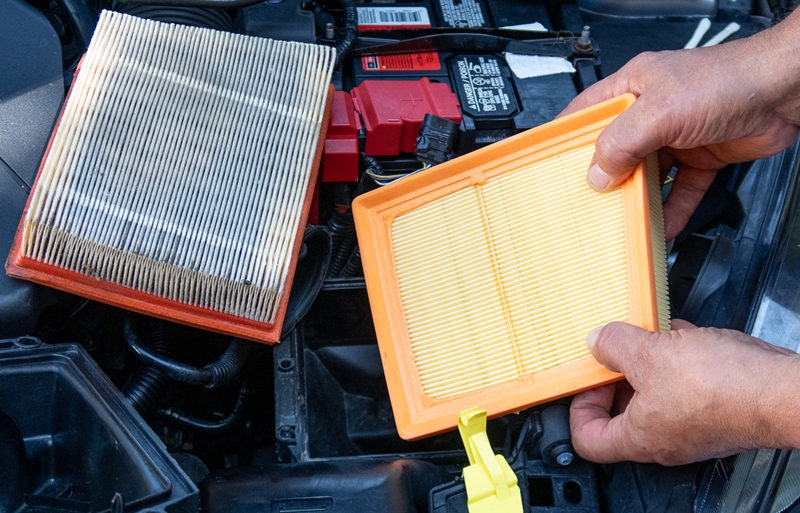
Difference Between Engine and Cabin Air Filters
When talking about car filter replacement, it’s important to understand the difference between the engine air filter and the cabin air filter. They serve entirely different functions, are located in separate areas of the vehicle, and follow their own replacement timelines. Knowing this helps when deciding how often to change car air filter versus your cabin filter.
Engine Air Filter:
- Protects the engine from dirt, dust, and debris
- Has a direct effect on fuel efficiency and vehicle performance
- Located under the hood in the engine compartment
- Plays a key role in how to get better gas mileage
Cabin Air Filter:
- Filters the air that enters the passenger compartment through the HVAC system
- Improves air quality inside the car, especially for allergy sufferers
- Typically located behind the glove box
- Affects ventilation, odor control, and your comfort while driving
Even though both filters need routine maintenance, they don’t follow the same schedule. While your engine filter might need replacing every 15,000 to 30,000 miles, cabin air filters are usually swapped out every 15,000 to 25,000 miles—sometimes sooner if you drive in high-pollen or dusty areas.
My dad learned this the hard way. For years, he was diligent about engine air filter replacements but completely forgot about the cabin air filter. One spring, during allergy season, he couldn’t figure out why he kept sneezing in his car—even though he had just changed the air filter. Turns out, the cabin filter hadn’t been touched in over 40,000 miles.
It was so packed with pollen and dust that it looked like a crumpled, dusty sponge. That moment really highlighted the importance of knowing not just how often to change car air filter, but also remembering that your car might have more than one that needs attention.
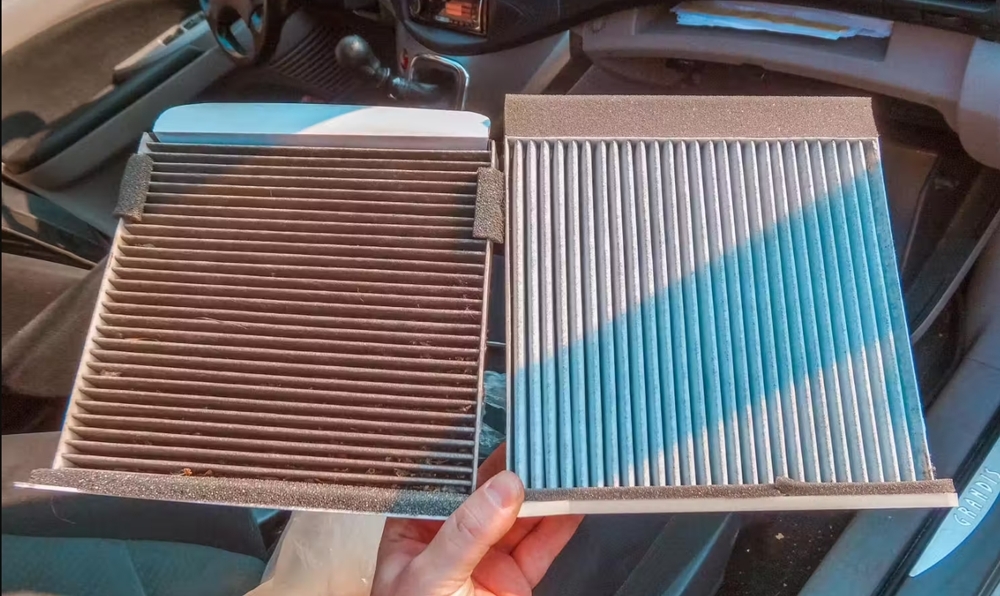
Cost vs. Benefit: Is Regular Air Filter Replacement Worth It?
When you’re managing car maintenance expenses, it’s fair to question whether replacing your air filter regularly is really worth the effort. But when you consider both the short-term gains and long-term savings, it becomes clear this small task delivers big value—especially when you understand how often to change car air filter based on your driving habits.
Costs of Regular Air Filter Replacement:
- DIY replacement: $10–$30 depending on your car make and model
- Professional service: $40–$100 including labor
- Time investment: Around 5–15 minutes if you do it yourself
Benefits of Staying on Top of Air Filter Maintenance:
- Improved fuel economy: A clean filter can improve mileage by 2–10%, potentially saving $50–$200 or more per year
- Longer engine life: Keeps harmful particles out, reducing internal wear
- Smoother acceleration and overall performance
- Fewer emissions
- Avoids expensive engine repairs caused by restricted airflow
Even if your fuel economy only improves by a modest 2–3%, the filter pays for itself in just a few months. Personally, I’ve tracked fuel mileage before and after filter changes in my family’s SUV. Every time we replace a clogged filter, we gain about 1.5 MPG—which adds up to about $80–$100 a year in fuel savings. Not bad for a part that costs under $20.
Best Practices for Air Filter Maintenance in Different Environments
Where you drive plays a huge role in determining how often to change car air filter. Your environment might demand more frequent changes—even if your mileage is low.
Urban/City Driving:
- More pollution and stop-and-go traffic
- Check the filter every 10,000 miles or about every 6 months
Dusty or Rural Areas:
- Driving on dirt roads, near construction, or in farmland kicks up more particles
- You may need a new filter every 5,000–10,000 miles
- Visually inspect the filter every 3–4 months
Extreme Weather Conditions:
- Heavy pollen seasons, road salt in winter, and dusty desert air all clog filters faster
- Adjust your replacement schedule accordingly
I learned this firsthand when I moved from the lush, rainy Pacific Northwest to the dry Southwest. Before the move, I could go nearly 20,000 miles between filter changes. But in my new desert surroundings—complete with dust storms—I noticed my car lagging at just 8,000 miles. That shift helped me really appreciate how often to change car air filter based on more than just a number on the odometer.
Premium vs. Standard Filters: Are Expensive Options Worth It?
When shopping for a new filter, you’ll see everything from basic $10 models to reusable filters costing $80 or more. So what’s the real difference?
Standard Filters:
- Made with paper-based materials
- Single-use and disposable
- Ideal for everyday driving
- Typically last 15,000–30,000 miles
- Cost: $10–$20
Premium Filters:
- Use synthetic or advanced filtration materials
- May offer slightly better airflow
- Cost: $20–$50
- Useful in harsher environments or high-performance vehicles
Reusable “Lifetime” Filters:
- Washable and designed to be reused
- Cost: $50–$80 upfront
- Require regular cleaning every 30,000–50,000 miles
- Reduce waste, but need more hands-on maintenance
So, are high-end filters worth it? In most cases, no. If your main concern is how to get better gas mileage, the most important thing is simply to replace a dirty filter—no matter what type it is. I tried a reusable filter in my sports car thinking I’d get a performance edge. Three years later, the cost savings were marginal, and the cleanup was more hassle than I expected. For my daily commute, I’ve switched back to standard filters and focus on sticking to a smart replacement schedule.
Common Myths About Air Filters and Fuel Economy
There’s no shortage of myths when it comes to air filters and fuel economy. If you’ve ever searched for advice on how often to change car air filter or how filters affect performance, you’ve likely run into some misleading claims. Let’s clear up a few of the most common ones:
Myth 1: You need to change your air filter with every oil change.
Reality: Not true for most drivers. Unless you’re driving in extremely dusty or dirty environments, your air filter can usually last through several oil changes. A quick visual inspection is often a better guide than following a rigid schedule.
Myth 2: Premium filters dramatically boost horsepower.
Reality: In standard vehicles, the increase is barely noticeable—maybe 1 or 2 horsepower at most. Unless your car is modified for high performance, a premium filter won’t transform your ride.
Myth 3: You can clean paper filters instead of replacing them.
Reality: Don’t try it. Standard paper filters aren’t designed to be cleaned, and doing so with air or water often damages the media, reducing effectiveness and risking engine damage.
Myth 4: Removing your air filter boosts performance.
Reality: This dangerous idea can let harmful debris into your engine. You might see a temporary bump in airflow, but the long-term damage far outweighs any gain. Never operate a vehicle without a functioning air filter.
Myth 5: Clean air filters don’t affect fuel economy in modern vehicles.
Reality: While today’s engines are more efficient than ever, they still depend on optimal airflow. A dirty filter can throw off the air-fuel balance, leading to poor fuel economy—even in newer cars.
I learned this the hard way. Years ago, I followed a DIY forum tip suggesting I “revive” my paper air filter with compressed air. Not only did it fail to improve airflow, but I later discovered I had damaged the filter media. That $15 I tried to save could’ve cost me a $3,000 engine rebuild. Lesson learned—and now I always check how often to change car air filter based on driving conditions, not myths.
How Air Filters Impact Long-Term Engine Health
When thinking about how often to change your air filter, many people focus on immediate benefits like better gas mileage or smoother acceleration. But there’s another big reason to stay on top of engine air filter replacement—your engine’s long-term health.
Modern engines are incredibly precise, with tight tolerances between moving parts. If even a small amount of dirt or grit sneaks past a clogged or damaged filter, it can:
- Accelerate wear on your cylinder walls
- Damage piston rings
- Contaminate your oil, reducing lubrication
- Cause scarring on bearings
- Contribute to carbon buildup in the combustion chamber
These issues don’t pop up overnight, but over time, they can significantly shorten your engine’s lifespan and lead to costly repairs. That’s why regular engine air filter replacement is such a simple yet powerful preventive measure. For something that takes 10 minutes to swap out and costs less than dinner, skipping it just isn’t worth the risk.
Over the last two decades, I’ve noticed a clear pattern: my vehicles with consistent engine air filter replacement run more reliably, develop fewer issues, and maintain performance much longer. My cousin’s truck is a prime example—at nearly 250,000 miles, it’s still running strong. He credits that longevity to changing the air filter every 10,000 miles without fail since day one.
Creating a Simple Air Filter Maintenance Schedule
Now that we’ve covered the myths and the mechanics, let’s wrap up with an easy plan for keeping your air filter in top shape. If you’ve ever wondered how often to change car air filter without overthinking it, this is your go-to guide.
For normal conditions:
- Inspect every 15,000 miles or once a year
- Replace if dirty, torn, or visibly clogged
For severe conditions (dusty roads, pollution, extreme weather):
- Inspect every 7,500 miles or every 6 months
- Replace more frequently as needed
Visual Check Tips:
- Hold the filter up to a bright light. If you can’t see much light passing through, it’s likely clogged.
- Look for dark gray or black discoloration
- Check for damage to the filter media or rubber seal
Stay Organized:
- Log the mileage and date of each engine air filter replacement
- Keep spare filters on hand so you’re always ready
- Sync filter checks with oil changes for added convenience
At the end of the day, remembering how often to change car air filter is one of the easiest ways to protect your engine, save money at the pump, and enjoy a smoother ride. It may seem like a small piece of the puzzle, but it plays a big role in your vehicle’s overall health.
Frequently Asked Questions
Q: How often should I really change my car’s air filter?
A: A good general rule is every 12,000 to 15,000 miles. However, how often to change car air filter can vary based on driving conditions. Dusty, polluted, or off-road environments may require more frequent replacements.
Q: Can a dirty air filter affect my gas mileage?
A: Yes. A clogged filter restricts airflow, which throws off the air-fuel mixture and reduces fuel efficiency. If you’re tracking how often to change car air filter, staying on schedule can improve mileage and save money.
Q: What if I don’t replace my air filter regularly?
A: Ignoring how often to change car air filter can lead to poor engine performance, increased emissions, and long-term engine wear due to contaminants entering the engine.
Q: Can I replace it myself?
A: Absolutely. Most air filters are easy to access and can be replaced in under 10 minutes with basic tools or none at all.
Q: Does air filter type matter?
A: Yes. OEM-style paper filters are ideal for everyday driving, while reusable or high-performance filters may benefit modified vehicles. Regardless of type, how often to change car air filter is still important to monitor.
Q: Will a new air filter improve acceleration?
A: In many cases, yes—especially if the old one was clogged. You might notice smoother throttle response and better engine performance.
Q: Should I follow the manual or go by mileage?
A: Both! Your owner’s manual gives a good baseline, but local conditions and how you drive play a big role in determining how often to change car air filter.
Troubleshooting a Dirty or Failing Air Filter
If you’re unsure how often to change car air filter, pay attention to these signs your filter may already need replacing:
- Reduced acceleration: If your car feels sluggish or slow to respond, the engine might not be getting enough air.
- Decreased fuel efficiency: A dirty filter disrupts the air-fuel ratio, forcing the engine to burn more fuel.
- Black smoke from the exhaust: This can signal incomplete combustion caused by restricted airflow.
- Unusual engine sounds: Whistling, coughing, or popping noises might indicate airflow issues from a clogged filter.
- Visible dirt or discoloration: During a visual inspection, if your filter is dark gray, torn, or coated in debris, it’s time for a new one.
Knowing how often to change car air filter helps prevent these problems before they start. For most drivers, checking it every 12,000 to 15,000 miles is a good rule of thumb—but driving in dusty or polluted conditions means you may need to check and replace it more frequently.
Don’t ignore the signs. Once you learn how often to change car air filter, sticking to a schedule can save you money and engine trouble down the road.
Final Thoughts
Understanding how often to change car air filter is one of the simplest yet most important parts of vehicle maintenance. While it may seem like a small detail, overlooking it can lead to reduced fuel economy, sluggish performance, and even long-term engine damage. The best approach is to base how often to change car air filter on your specific driving conditions and always follow up with regular inspections. Many drivers ask how often to change car air filter and assume it’s a one-size-fits-all answer—but staying flexible and observant is key. If you’re ever in doubt about how often to change car air filter, err on the side of caution. Your engine—and your wallet—will thank you.

